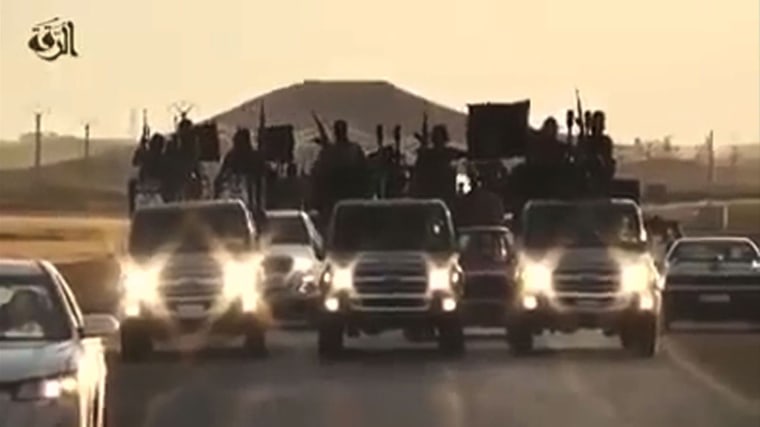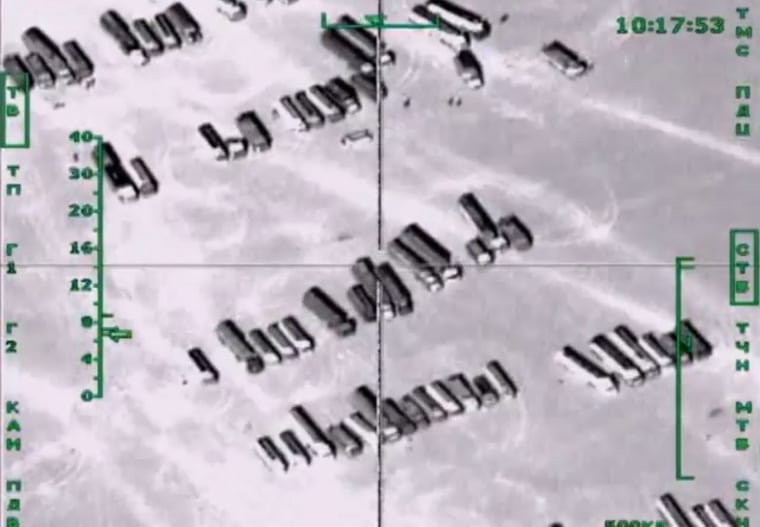For the first time since the U.S. began a massive bombing campaign against ISIS in Iraq and Syria in 2014, American officials say they have achieved some success in slowing the flow of foreign fighters streaming across the Turkish border into the group’s self-declared caliphate.
But U.S. intelligence officials tell NBC News the modest improvement hasn’t significantly changed the strategic picture, despite the positive spin by a top general to reporters this week.
A new estimate by U.S. intelligence agencies shows that the total number of foreign fighters on the battlefield has increased by 6,000 since last fall, to 36,500, the officials say. A year ago, the number was 20,000.
The CIA and other agencies have also documented an uptick in the number of Islamic State recruits going to Libya, a lawless, chaotic country that is quickly becoming an alternative safe haven for the terror group, American officials say.
“There’s been some progress, but I don’t think we are fully where we want to be,” Ben Rhodes, a top White House foreign policy adviser, said Friday at a Bloomberg lunch with reporters in Washington.

Rhodes said it will take years to defeat the Islamic State, and Obama’s ambition in the last months of his presidency is to put the group “on a path to defeat.”
Even if the U.S.-led coalition pushes the group out of the cities and towns it holds in Iraq and Syria, Rhodes said, it will remain for several years a potent terrorist force with tentacles around the Middle East. The U.S. will then have to “grind them down…like we did with al Qaeda.” The al Qaeda campaign has involved a decade of drone strikes and special operations raids.
He added, “As you deny (ISIS) territory, they get more focused in some respects on external operations,” meaning terrorist attacks against the West.
Rhode’s comments were notably more measured than those of Gen. Lloyd Austin, the outgoing commander of U.S. Central Command, who painted a picture of progress as he briefed reporters on the state of the war during a news conference in Tampa Thursday.
“Because we have greater activity along the Syria-Turkish border, by the Turks and by our forces,” Austin said, “we've been able to slow down the flow of foreign terrorist fighters coming into the theater. At the same time, we've been able to increase the amount of pressure that we're putting on the enemy with great effect.”
He added, “As you look across the battle space you see real progress being made by the coalition.”
Rhodes said the U.S. has put a dedicated focus on a particular area of the border and have had an effect in slowing the flow of foreign fighters, but again, this requires a sustained, multifaceted efforts that includes the Turks.”
U.S. intelligence officials told NBC News that while the pace of foreign fighters crossing the Turkish border has slowed, it hasn’t been by much.
According to their latest estimate by the National Counter Terrorism Center, more than 36,500 from at least 120 countries have gone to fight in Iraq and Syria since the start of the conflict, up from 31,000 last fall. The number includes at least 6,600 Westerners.
Around 250 Americans have traveled or attempted to travel to Syria or Iraq "to fight or otherwise support the conflict," officials say, and two dozen have died there.
At least 700 British citizens have traveled to fight in Iraq and Syria, and more than 100 have died, officials say.

U.S. officials estimate the Islamic State’s total fighting strength at around 30,000. The influx of foreign fighters have tended to replenish the ranks of the 1,000 to 2,000 the U.S. military says it kills each month.
Intelligence officials say they believe allure of fighting for the Islamic State in Syria has faded somewhat amid the carnage of coalition air strikes. But they can point to no hard data to back that up.
"The threat is increasing, not decreasing," House Homeland Security Committee Chairman Michael McCaul told reporters last week. "I don't think the strategy is working."
CENTCOM, which is running the war against ISIS, has been the focus of allegations that senior officials skewed intelligence assessments to exaggerate progress--allegations that are now under investigation.
Defense Secretary Ash Carter, who briefed reporters alongside Austin, did not directly answer a question asking whether he was confident he was receiving unvarnished intelligence from CENTCOM.
